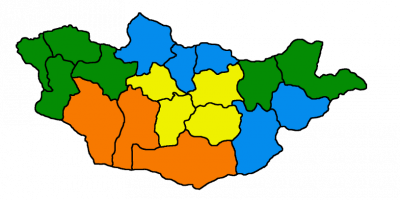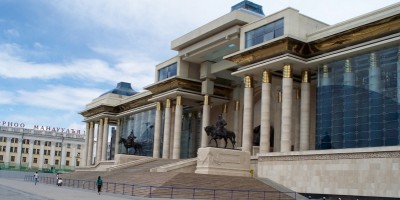Thirty-nine is the magic number in Mongolian national politics. As J.R.R. Tolkien might have written, “Thirty-nine seats to rule them all.” For any government to form, the constitution requires the support of 39 members of parliament, and once a party or coalition reaches that magic number, everyone else in opposition recedes into political irrelevance. Or, at least, it would seem that way based on how opposition parties generally behave each time a new government forms.
Think of Chicken Little but with democracy falling instead of the sky. Last week the courts and the General Election Commission (GEC) provided another opportunity to demonstrate just how important this number is in Mongolian politics. They ruled that N. Tumurkhuu and S. Chinzorig the candidates for the Mongolian People’s Party (MPP), which was formerly the Mongolian People’s Revolutionary Party (MPRP), in Uvurkhangai Province had violated campaign laws and their victories in the election should be nullified and shifted to the next two best performing candidates from the ruling Democratic Party (DP) G. Batkhuu and D. Zorigt. This touched off an unusual protest in which the leading members of the MPP blocked entrance to the parliamentary chamber in the government palace, refusing to allow parliament to convene and swear in the new DP members. They held signs that read “The Democratic Party has killed democracy” or “Mongolian Democracy aged 22 has died,” among many other pithy political slogans. This protest and its theatrics makes sense when you take into account the importance of the number 39.
There is so much to keep straight it requires some extensive explaining. Currently there are 71 members of parliament sworn in out of 76 seats. Two of the seats have been handed to the DP with the recent ruling, and the three remaining seats will be filled in the local elections next month. These seats were not filled in the summer elections because no candidate in those districts reached the requisite 28 or more percent of the vote, turning the those contests into run-offs.
The DP failed to win 39 seats outright in the elections this summer, so in order to form a government with its 31 seats, they needed the support of minority parties to reach the magic number. The “new” Mongolian People’s Revolutionary Party (new-MPRP), which is a splinter group of the MPP, formed the “Justice Coalition” with the Mongolian National Democratic Party (MNDP) prior to the election, and this coalition was able to garner 10 seats. With the DP’s 31 and the new-MPRP-MNDP’s 10 seats a coalition government with a few seats to spare was formed.
The coalition is fragile in part because coalitions are inherently so, but mostly because the members of the new-MPRP-MNDP coalition are ideologically more aligned with the opposition MPP. The coalition government is made possible by the DP’s relative proximity to 39 seats, and the new-MPRP-MNDP coalition appears to be a member of the coalition government out of political advantage more than anything else. If the MPP, which currently has 25 seats, could inch closer to the DP’s count of 31 seats, then it had a real shot at wresting control from the DP coalition government. The loss of those two seats in Uvurkhangai makes the math extremely difficult for the MPP going forward. They will need to pick up all three seats next month, capture the MPRP-MNDP coalition, and woo at least one Civil Will Green Party or independent member of parliament to have any chance at forming a government.
It is helpful to take history into account. The DP found themselves in a similar situation to their current one after the 2004 elections. They were unable to win enough seats to form a government outright, and they had to rely on a handful of independent and minority party members to form a coalition government. Within several months the MPRP (now MPP) was able to woo those swing votes their direction and form an MPRP dominated government. That was undoubtedly a bitter loss for the DP, especially given that from 2000 to 2004 the DP was essentially locked out of national politics when the MPRP held 72 of the 76 seats in parliament.
In 2008, an even greater political disaster hit the DP when the MPRP won 42 seats in the election, more than enough to form a government without a coalition. The reaction to the election results was dramatic from the political opposition, culminating in a tragic riot that left 5 people dead and hundreds arrested. Politically the fall out from the riot worked very much in the DP’s favor, because the ruling MPRP in the end chose to form a coalition government with the DP to reduce tensions and neutralize accusations the elections had been “stolen.”
The 2012 elections propelled the DP back into power, but its position is as fragile as ever. It is not hard to find interviews of members of the new-MPRP-MNDP coalition talking about how they will eventually need to reconcile with the MPP, which presumably means that eventually if the conditions are right, a change in government might come around. For the DP, holding its coalition got a whole lot easier with the court and GEC rulings, because they are no longer necessarily dependent on the new-MPRP-MNDP coalition to stay in power.
The MPP is truly in a difficult position much like the DP was in 2008. At this point, blocking parliament from meeting is more theatrics than anything else, but this ruling and the opposition reaction does put Mongolia’s democracy to the test once again. It is not entirely clear that the ruling is “fair,” and what I understand at this point is the campaign violations the two candidates were found guilty of was using underage people in some of their campaign materials. As an American, where politicians routinely violate every known standard in the pursuit of election, this seems like hardly an offense worthy of stripping someone of his/her victory. But, not knowing the extent of the campaign laws, it is hard to pass judgment at this point, and much of the coverage in the papers thus far has focused on the MPP protest rather than the merits of the ruling. It may in fact be as fair a ruling as the circumstances could allow. However, the mere appearance of the ruling being a political godsend for the DP does provide enough pretext for theatrics and even more going forward. The MPP, as was the case of the DP in 2008, suddenly have nothing to lose. Their choice is to be an irrelevant opposition party for the next three and half years or to make such a stink that someway, somehow they are brought back from the political dead. In the end, it comes down to the magic number 39, and that alluring number is further away than ever for the MPP.



